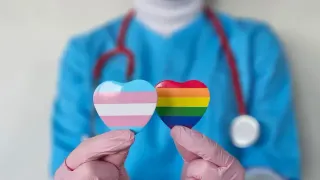August 7, 2014
Prosecutor: Oscar Pistorius is 'Appalling Witness'
Bobby McGuire READ TIME: 3 MIN.
PRETORIA, South Africa -- Oscar Pistorius was an "appalling witness" who repeatedly lied in his testimony in a crude attempt to defend against a murder charge for killing girlfriend Reeva Steenkamp, the chief prosecutor said Thursday during closing arguments in the athlete's trial.
Prosecutor Gerrie Nel also harshly criticized the legal team of the double-amputee athlete, saying it floated more than one theory about what happened on the night that Pistorius shot Steenkamp through a closed toilet door in his home. Defense lawyers, Nel said, had argued that Pistorius acted in self-defense, fearing an intruder was in the house, but also raised the possibility that he was not criminally responsible, accidentally shooting Steenkamp because he was "startled."
"It's two defenses that you can never reconcile," Nel said as Pistorius sat behind him in the dock. The once-celebrated athlete appeared calm, in contrast to some past occasions during which he retched and wailed in apparent distress.
The fathers of the Olympic runner and Steenkamp, a model and television personality, were in the Pretoria courthouse for the first time since the trial began in early March. They sat at opposite ends of a long bench in the gallery. Pistorius is said to be estranged from his father, Henke, and Steenkamp's father, Barry, has been ill.
Pistorius' older brother Carl, who has regularly attended court sessions, was in an intensive care unit in a South African hospital and was on a ventilator because of injuries suffered in a serious car crash last week, the Pistorius family said in a statement.
Barry Roux, the chief defense lawyer, listened and checked files as Nel spoke for hours, occasionally urged by Judge Thokozile Masipa to speed it up, as he elaborated on the prosecution's written arguments of more than 100 pages that were submitted to the court last week. Roux will present his final arguments on Friday before Masipa adjourns the trial to deliberate with two legal assistants on a verdict.
The prosecution has argued that Pistorius intentionally shot Steenkamp before dawn on Feb. 14, 2013 after a quarrel. The defense has previously contended that he fired by mistake, thinking he was about to be attacked by an assailant in the toilet and that Steenkamp was in the bedroom.
Pistorius was vague in allegations that police had possibly tampered with evidence around the scene of the shooting, including fans and a bedcover strewn on the floor of his bedroom, according to Nel. It was also improbable that the athlete, in his version, rushed with his gun to investigate a purported sound in the bathroom without first trying to talk to Steenkamp and confirm that she was safe, the prosecutor said.
"We cannot argue that he was the worst witness ever, that honor belongs to someone else," said the prosecution's written argument. "The accused was, however, demonstrably one of the worst witnesses ever encountered."
The prosecution said Pistorius "used well-calculated and rehearsed emotional outbursts to deflect the attention and avoid having to answer questions."
A psychologist who examined Pistorius during a court-ordered observation period concluded that the athlete had become severely traumatized since the killing and could become an increasing suicide risk unless he continues to get mental health care.
In addition to the murder charge, Pistorius faces three separate gun-related charges, one of which stems from his alleged firing of a shot in a crowded restaurant in Johannesburg, months before he killed Steenkamp. He has pleaded not guilty to all charges.
Because South Africa has no trial by jury, Judge Masipa will decide if Pistorius committed murder, is guilty of a negligent killing, or if he made a tragic error and should be acquitted. The runner faces 25 years to life in prison if convicted of premeditated murder, and also would be sent to prison for years if guilty of murder without premeditation or culpable homicide.
Earlier, Masipa told Nel and defense lawyer Roux that they had only until the end of Friday to complete their final arguments in court.
"Unless, of course, you want to work on a Saturday and perhaps Sunday, after church," she said, smiling.






